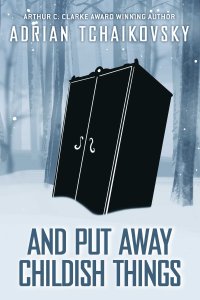Gary K. Wolfe Reviews Bridge by Lauren Beukes
 Bridge, Lauren Beukes (Mulholland 978-0-316-26788-5, 424pp, $29.00, hc) August 2023.
Bridge, Lauren Beukes (Mulholland 978-0-316-26788-5, 424pp, $29.00, hc) August 2023.
It’s always fascinating to watch SFF concepts migrate into general fiction (a term which, following the lead of librarians, I have just now decided to use instead of ‘‘mainstream,’’ since ‘‘mainstream’’ is so – well, mainstream). Human cloning was pretty much the province of genre SF, until it wasn’t with novels like Ishiguro’s Never Let Me Go, while time travel morphed into just another romantic narrative device in Niffenegger’s The Time Traveler’s Wife and others. This isn’t necessarily a bad thing, since such novels, along with a handful of blockbuster movies and TV shows, not only validate the fantastic as a set of narrative strategies, but provide convenient primers to help mass audiences grasp the basics of the concept (time travel became a lot easier to sell once the Back to the Future movies laid out the principles). The latest concept to get the treatment is the multiverse, thanks to films like Everything Everywhere All at Once and the entire Marvel franchise (which treats it as a whole deck of get-out-of-jail-free cards, not to mention a set of CGI design problems). The idea dates back in pulp history at least to Murray Leinster’s 1934 ‘‘Sidewise in Time’’ and in literary fantasy to Borge’s ‘‘The Garden of Forking Paths’’ in 1941, but of course it was Hugh Everett whose theory yanked it firmly into SF, where it more or less sat for decades until the last few years.
Now here comes Lauren Beukes, whose 2013 The Shining Girls played shrewd cross-genre variations on time travel (a serial killer mystery with a time-shifting house), and whose Clarke Award-winning Zoo City demonstrated a sophisticated facility with alternate history. Bridge is her version of the multiverse, and it has very little to do with science and nothing at all to do with superheroes. It does feature a genuinely chilling villain with Thanos-level ambitions, though, and a mechanism for world-hopping that owes less to quantum physics than to body horror. That would be something called the Dreamworm, a cocoon-like pod with tiny threads which, when consumed, turns out to be a portal to alternate realities. (Later, we learn that the threads can also grow out of the skin of certain people, where they can be harvested in sometimes-gruesome ways.) Bridget Kittinger-Harris, called Bridge, finds such a Dreamworm when cleaning out her deceased mother’s house with the assistance of her closest friend, Dom, who is not only the novel’s most appealing character, but also something of a stand-in for the reader. Bridget not only explains to Dom her family’s fraught history with the Dreamworm – whose origins are mysterious – but the various unresolved tensions with her mother, a neurologist who at the time of her death was trying to compile some sort of index to the various realities she had visited. For their part, Dom is not only the level-headed friend who resists personally trying out the Dreamworm, but is the most stable point of view in the book.
And the various points of view can at times be daunting, even for an alert reader. Bridget’s own viewpoints can range from her childhood experiences with her mother, both in her home world and various alternates, to her current quest to find a world in which her mother might still be alive. Her mother’s point of view also shows up in various diary excerpts over a period of decades. Another viewpoint belongs to a shadowy character named Amber, who convenes support groups for ‘‘Tomesians,’’ people who believe that the reality-altering fibers are growing out of their own skin, though Amber’s own motives are far more ominous. To complicate things even further, each time Bridget visits another reality, she trades places with the version of herself there, leaving the alternate Bridget confused and disoriented in Bridget’s home world (and giving the overworked Dom the task of effectively babysitting these alternate Bridgets). And, in a rather neat touch, we gradually learn that Bridget’s own home world is not ours; instead of Facebook there is Lifebook; instead of YouTube, Youvids; and at one point when visiting another reality, Bridget comes across a giant store she’s never heard of called Walmart. All this requires some precision juggling on Beukes’s part, and for the most part she manages it with considerable skill, hopping us from one reality and one time period to another and introducing us to a fascinating variety of secondary characters, all while accelerating the pace of the narrative and increasing the stakes in classic thriller form. Readers who admired the comparatively linear plot of The Shining Girls may find Bridge a bit more demanding, but Beukes’s take on the multiverse is entirely her own, as are her characteristically memorable and troubled characters.
Gary K. Wolfe is Emeritus Professor of Humanities at Roosevelt University and a reviewer for Locus magazine since 1991. His reviews have been collected in Soundings (BSFA Award 2006; Hugo nominee), Bearings (Hugo nominee 2011), and Sightings (2011), and his Evaporating Genres: Essays on Fantastic Literature (Wesleyan) received the Locus Award in 2012. Earlier books include The Known and the Unknown: The Iconography of Science Fiction (Eaton Award, 1981), Harlan Ellison: The Edge of Forever (with Ellen Weil, 2002), and David Lindsay (1982). For the Library of America, he edited American Science Fiction: Nine Classic Novels of the 1950s in 2012, with a similar set for the 1960s forthcoming. He has received the Pilgrim Award from the Science Fiction Research Association, the Distinguished Scholarship Award from the International Association for the Fantastic in the Arts, and a Special World Fantasy Award for criticism. His 24-lecture series How Great Science Fiction Works appeared from The Great Courses in 2016. He has received six Hugo nominations, two for his reviews collections and four for The Coode Street Podcast, which he has co-hosted with Jonathan Strahan for more than 300 episodes. He lives in Chicago.
This review and more like it in the August 2023 issue of Locus.
 While you are here, please take a moment to support Locus with a one-time or recurring donation. We rely on reader donations to keep the magazine and site going, and would like to keep the site paywall free, but WE NEED YOUR FINANCIAL SUPPORT to continue quality coverage of the science fiction and fantasy field.
While you are here, please take a moment to support Locus with a one-time or recurring donation. We rely on reader donations to keep the magazine and site going, and would like to keep the site paywall free, but WE NEED YOUR FINANCIAL SUPPORT to continue quality coverage of the science fiction and fantasy field.
©Locus Magazine. Copyrighted material may not be republished without permission of LSFF.







